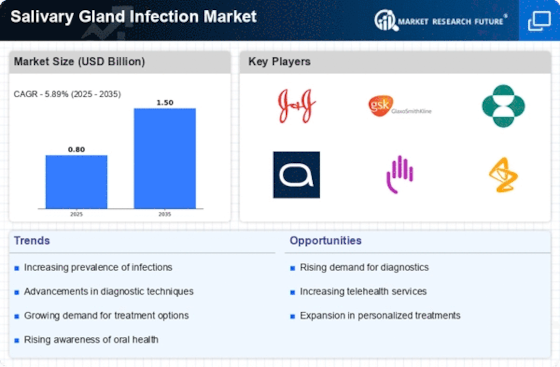Rising Geriatric Population
The rising geriatric population is a significant factor driving the Salivary Gland Infection Market. As the global population ages, the prevalence of chronic diseases and conditions that predispose individuals to salivary gland infections is expected to increase. Older adults often experience reduced salivary flow and other oral health issues, making them more susceptible to infections. This demographic shift necessitates the development of specialized treatment options and healthcare services tailored to the needs of the elderly. Consequently, the market is likely to see a surge in demand for products and services aimed at this vulnerable population, thereby enhancing growth prospects.
Growing Demand for Preventive Healthcare
The growing demand for preventive healthcare is a critical driver for the Salivary Gland Infection Market. As individuals become more health-conscious, there is an increasing emphasis on preventive measures to avoid infections. This trend is reflected in the rising sales of oral hygiene products and regular dental check-ups, which are essential in preventing salivary gland infections. Additionally, public health campaigns aimed at educating the population about the importance of oral health are likely to contribute to market growth. The focus on prevention not only enhances patient outcomes but also reduces the overall healthcare burden, thereby fostering a more robust market environment.
Increased Research and Development Activities
Increased research and development activities are propelling the Salivary Gland Infection Market forward. Ongoing studies aimed at understanding the pathophysiology of salivary gland infections and exploring novel therapeutic agents are crucial for market expansion. Pharmaceutical companies and research institutions are investing significantly in R&D to develop effective treatments and diagnostic tools. This focus on innovation is likely to lead to the introduction of new products that address unmet medical needs in the management of salivary gland infections. As a result, the market is expected to benefit from a continuous influx of advanced solutions, enhancing overall patient care.
Increasing Incidence of Salivary Gland Infections
The rising incidence of salivary gland infections is a notable driver for the Salivary Gland Infection Market. Factors such as poor oral hygiene, dehydration, and certain medical conditions contribute to this increase. Reports indicate that infections like sialadenitis are becoming more prevalent, particularly among older adults and individuals with compromised immune systems. This trend is likely to escalate the demand for effective treatment options and diagnostic tools within the market. As healthcare providers become more aware of these infections, the need for innovative therapies and preventive measures is expected to grow, thereby enhancing the overall market landscape.
Technological Advancements in Treatment Modalities
Technological advancements in treatment modalities are significantly influencing the Salivary Gland Infection Market. Innovations such as minimally invasive surgical techniques and the development of targeted therapies are transforming how these infections are managed. For instance, the introduction of endoscopic procedures has improved patient outcomes and reduced recovery times. Furthermore, the integration of telemedicine in consultations allows for timely diagnosis and treatment, which is crucial in managing salivary gland infections. As these technologies continue to evolve, they are likely to attract investment and research, thereby expanding the market and improving patient care.
















